General devoted to the idea of the monarchy: José Enrique Varela, Minister of War and comrade-in-arms of Franco
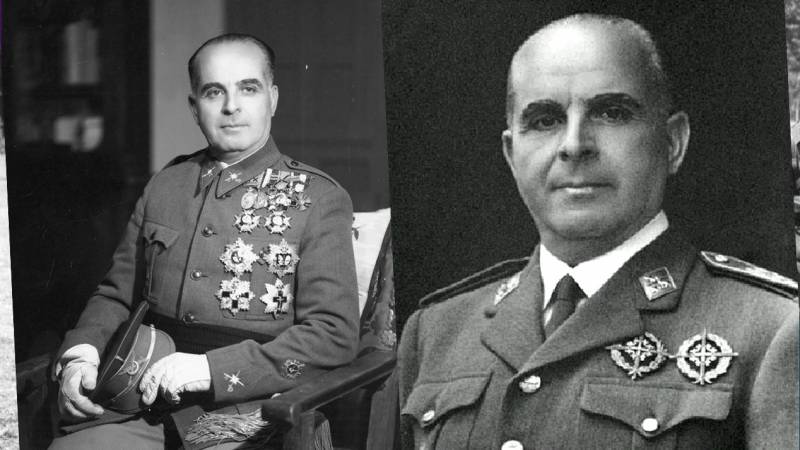
The army has traditionally played an exceptional role in the political life of Spain and had a decisive influence on the state of the country's political life. As researchers note, during the 18th century, the military intervened in the political life of the country at least 1876 times through riots, conspiracies and coups. The Constitution of 3 gave the military a special place in the structure of the state. The highest command staff of the army (generals and lieutenant generals) were, by position, among the senators of the Spanish parliament [XNUMX].
For this reason, the coming to power of the Republicans in 1931 and the military reform, which mainly boiled down to a reduction in the number of military units and the command staff of the armed forces, were painfully perceived by the overwhelming majority of the officer corps. Democratic slogans and revolutionary calls of the Republicans for the destruction of the old political system influenced the pride of the Spanish military, who had become accustomed over the years of the monarchy to a leading role in the socio-political life of the country [5].
Nevertheless, the Spanish army quite calmly tolerated the abolition of monarchical military symbols and other attributes, which for the majority of officers were the most valuable components of ideological and military education. The army began to show concern only when the democratic reforms of the Republic reached a dead end. Spain in 1934–1936 there was a danger of national disintegration and anarchist tyranny. Republican leaders were unable to solve the problems set before them historical development of the Spanish state [5]. It is in this context that the attempted military coup should be viewed.
Quite often, studies examining the officer corps of the National Army, the army of Francisco Franco, have a certain ideological overtones. Partisan researchers sometimes classify them all as “fascists,” despite the fact that the Spanish nationalist and monarchist/traditionalist forces were diverse in origin.
Their core consisted of the colonial army transferred from Spanish Morocco, regular army sympathizers who joined the 1936 uprising, and troops subsequently raised in Spain through voluntary recruitment and conscription. It would be incorrect to characterize the Francoists as some kind of “agents of international fascism”: for the overwhelming majority, the war was exclusively an internal affair of Spain, many perceived it as a Catholic crusade [4].
Among the Francoist National Army there were quite a lot of talented officers who deserve to have a separate article written about them. Among them, one should especially highlight José Enrique Varela, an officer who began his career as a private and ended it with the rank of captain general.
Unfortunately, in Russian the topic of the officer corps of the Francoist army has been poorly studied, and the figure of Jose Enrique Varela is no exception. For this reason, the author used mainly sources in foreign languages, primarily the book by Professor Federico Martinez Roda - Varela: el general antifascista de Franco (“Varela. Anti-fascist General Franco”).
The youth of H. E. Varela, his upbringing and education
Jose Enrique Varela Iglesias was born on April 17, 1891 in the town of San Fernando (Cadiz) in the family of Sergeant Juan Varela Perez, head of the bugler band of the 1st Marine Infantry Regiment, and Carmen Iglesias Perez.
Varela studied at the Colegio de los Hermanos de la Doctrina Cristiana (College of the Brothers of Christian Doctrine), owned by the Brothers of the Christian Schools. Examinations for official qualifications were held at the General Technical Institute of Cadiz, but the content of its training bore the stamp of Catholic education. This solid Christian education accompanied him all his life; Moreover, he subsequently maintained correspondence and contacts with former teachers [1].
Although José Enrique was not a very good student, since 1905, according to the current rules, he could qualify for admission to the military academy, but the family income was not enough to pay these expenses [2].
On June 2, 1909, at the age of eighteen, he enlisted as a bugler in his father's band, and three months later became a volunteer soldier in his regiment. Thanks to his studies at the gymnasium, he received the rank of sergeant in a short time, which allowed him to pay the costs associated with admission and training at the Infantry Academy in Toledo (Academia de Infanteria de Toledo) [2].
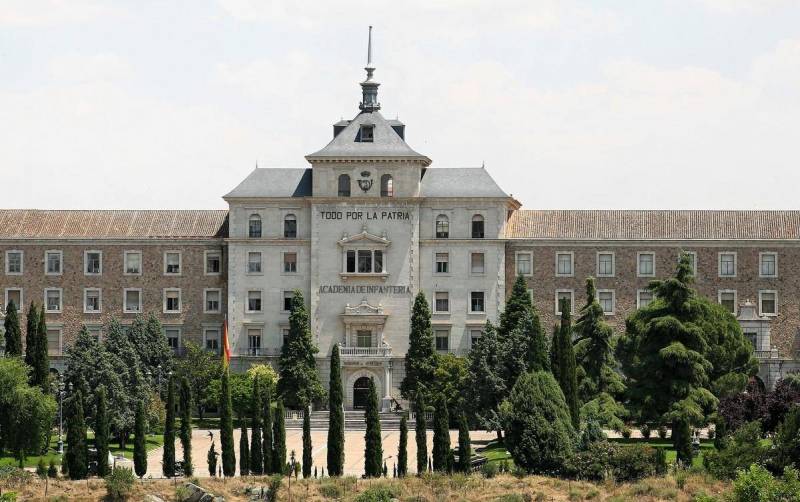
Building of the Toledo Infantry Academy, Toledo, Spain.
He himself subsequently described the first years of his life as follows:
It should be noted that, in addition to Jose Enrique Varela, Francisco Franco passed through the infantry academy in Toledo, as well as a number of famous officers who later took a prominent place in the Francoist structures - Juan Yagüe, Heli Rolando de Tella y Cantos, Francisco Franco Salgado-Araujo (caudillo's cousin), Emilio Esteban Infantes. The Academy was considered a forge of military personnel.
José Enrique Varela's last year at the academy coincided with a traumatic family situation: in January 1915, he lost his father. The influence of his father, a first sergeant in the Marine Corps, was probably decisive in his military vocation. The death of his father left him as the only male in the family. He took upon himself the care of his widowed mother, who had three daughters, according to various testimonies, always sending her a significant part of his salary [1].
Raised in the spirit of traditional Christian values, José Enrique Varela always acted according to his beliefs, both in his family and professional life.
Soon, as a member of the 19th graduating class of the Infantry Academy, he was appointed second lieutenant in June 1915 and sent to Africa [1].
War in Africa and the military career of H. E. Varela
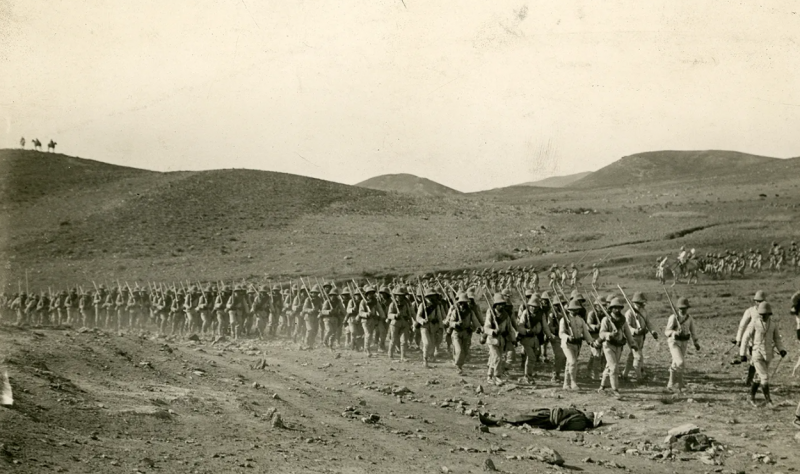
The Spanish government's move to establish a formal protectorate over Northern Morocco in 1913 was a defensive rather than an offensive initiative. After 1898, few Spaniards dreamed of new imperial glory, and if a Spanish protectorate was created, it was mainly because both Madrid and London wanted to prevent the extension of French rule to Tangier, which would lead to the absorption of all of Morocco.
The Spanish government's policy towards Morocco three years after the establishment of the protectorate was not clearly defined, which undoubtedly affected the actions of the troops, who were in constant combat readiness. In 1915, the zone of Spanish influence remained fairly stable, and Lieutenant Varela during the first ten months of his service was limited to escorting convoys and guarding forward positions [2].
Nevertheless, this stability was relative - the Moroccan tribes, nominally under the rule of the Sultan, who collected exorbitant taxes from local princes, constantly rebelled against him. With the arrival of the Spaniards the situation did not change much. Together with Morocco, Spain acquired a smoldering source of conflict that required a constant military presence [7].
On January 25, 1919, the President of the Council of Ministers, Count Romanores (Conde de Romanores), appointed the Minister of War, General Damaso Berenguer Fusté, as High Commissioner and agreed to carry out limited operations in the area of the Lucus River, which borders the French zone and is a refuge for the rebels. The operations that were entrusted to the Larash group and began on February 22 were successful and marked Varela's baptism of fire [2].
Lieutenant Varela took part in many operations against the Moroccan tribes and, according to his service record, fought at more than twenty different points. In addition to the praise of his immediate commanders (Major Pacheco called him irreplaceable), the name of Lieutenant Varela began to appear in the military chronicles of Spanish journalists [1].
During the first military campaigns in Morocco, Spain failed to take control of the entire territory, and this task was postponed until the end of the First World War. The attempt to achieve it led to a humiliating military defeat in 1921. The Rif tribes, united by the talented military leader Abd-el-Krim, completely defeated the twenty-thousand-strong Spanish corps under the command of General Silvestre in a five-day battle near Anual.
The period from 1920–1923, when Lieutenant Varela was awarded two Crosses of San Fernando with laurel branches, the highest award of the Spanish Army, stands out in terms of military organization in Morocco, since it was during this period that the Spanish Legion was created. The principles of organizing this unit were borrowed from France, which created the Foreign Legion for heavy colonial service.
By royal order of June 11, 1922, Lieutenant Varela was promoted to captain. After the proclamation of the Rif Republic, which was located in the center of the protectorate and divided Spanish Morocco into two isolated parts, the military task in the western part of the protectorate was reduced to the pacification or defeat of the openly rebellious Moroccan tribes [1].
In February 1924, Varela was appointed to attend the air observer course held at the Cuatro Vientos airfield (Madrid). On March 12, for military merits, he was awarded the rank of major, in April he underwent flight training at the Los Alcazares airfield (Seville), and in May he was assigned to the Melilla bomber squadron, located in Tauim [2].
The relative calm of the beginning of 1925, caused by the actions of Abd-el-Krim's troops in the French zone, allowed the Spaniards to complete preparations for the defeat of the Rif Republic. As a result of a well-prepared military operation coordinated with France, in which José Enrique Varela was directly involved, the Rif capital fell on October 2, and the end of the war was not long in coming. In the spring of 1926, under the attacks of Spanish-French troops, the Moroccan army folded weapon [7].
In February 1926, Varela was promoted to lieutenant colonel for military services, and in 1929 to colonel. The “African” period of Varela’s military career was over.
The Proclamation of the Republic and the Conspiracy Against It: The Colonel Makes a Choice
In 1929, the military attaché in Berlin, Lieutenant Colonel Juan Beigbeder Atienza, invited H. E. Varela to go on a training trip to familiarize himself with the changes that had occurred in the main European armies after the First World War. Varela agreed to this proposal.
On August 14, on instructions from the General Staff, he went to France, where he visited the battlefields in Metz and took part in tank maneuvers. Then, after a short stay in Switzerland, he went to Dresden, where he took part in further maneuvers and visited various units.[2]
The unexpected proclamation of the republic on April 12, 1931 had no immediate consequences for Varela, but from April 27 to May 12, 1931, two events occurred that alerted the colonel. On April 27, without waiting for the adoption of the Constitution or even parliament, by decree of the provisional government it was decided to change the state flag. The flag of Republican Spain was to consist of three stripes: red, yellow and purple.
In addition, the royal march was canceled, and the Riego anthem was installed as the anthem. The main symbols of the nation: the flag, coat of arms and anthem, so revered by the military and so dear to Colonel Varela, were replaced with one stroke of the pen, without discussion with the population and without the consent of parliament, since elections to the Constituent Court took place two months later, in June 1931 [1 ].
The position of Colonel Varela on May 11, 1931 is more indicative. After the burning of the Santo Domingo monastery in Cadiz, he ordered his regiment to patrol the area to prevent further disturbances of public order, and he succeeded.
The atmosphere of instability that reigned in Spain also had a significant impact on the position of H. E. Varela: he was attacked near Santo Domingo, as a result of which he remained unharmed, but the lieutenant accompanying him was seriously wounded [2].
In this situation, Varela, who was friends with General Jose Sanjurjo, decided to support the coup d'etat that he was preparing.
On the one hand, the colonel was in complete agreement with General Sanjurjo in his political analysis in the sense that Spain was moving in the wrong direction and it had to be stopped by a military uprising.
On the other hand, he also understood that the impending coup did not have the necessary preparation and even caution [1].
The attempted coup on August 10, 1932 failed and, although there was no evidence against H. E. Varela (he and his unit did not have time to take part in it), he was arrested for 6 months. In prison in Seville he met several pro-Sanjurjo officers and subsequently maintained close contacts with the Comunión Tradicionalista, a Carlist movement.
On December 12, 1932, Colonel Varela and a group of defendants were transported from Seville to the Central Prison in Guadalajara. There, according to the then commandant of Redondo, he was visited by one of the Carlist leaders, Manuel Fal Conde*, who asked him to develop the Charter of Requete - the basis of the paramilitary organization of the traditionalist Carlist militia, which later played an important role in the Civil War [1].
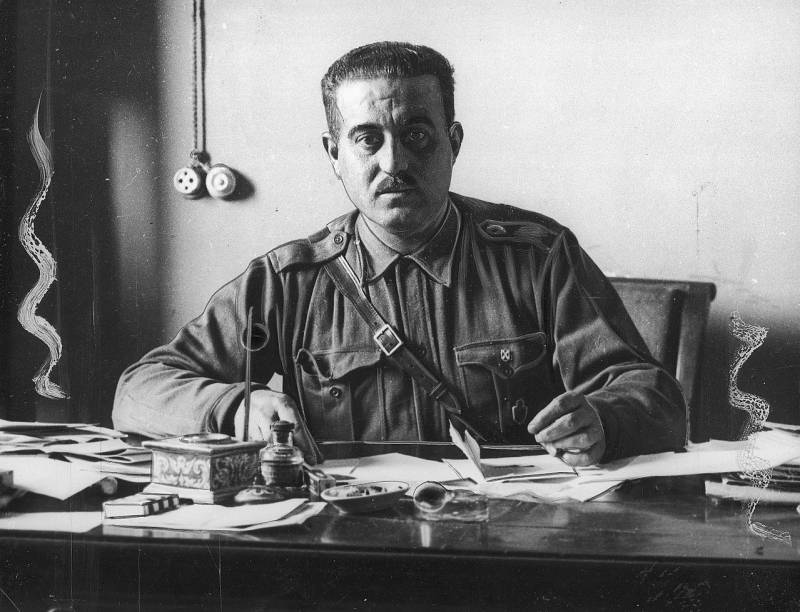
*Manuel Fall Conde (1894–1975) – one of the most famous Carlist leaders during the Civil War of 1936–1939, head of the “Traditionalist Community” in 1935–1955. The death of General Sanjurjo deprived him of a key ally among the Spanish generals.
On February 14, 1933, the Supreme Court decided to temporarily release Varela, and on April 27, the case against him was finally dismissed. The colonel's position in relation to the republic was finally formed - he was increasingly convinced that the country was moving in the wrong direction and needed political changes.
The events taking place in Spain contributed to Varela's rejection of the republic - left-wing radicalism was gaining strength, in October 1934 the “Asturian Revolution” led to the murder of 37 priests and monks by left-wing radicals and the destruction of 58 churches - actions that many conservatives perceived as the beginning of the “Red Terror” [4].
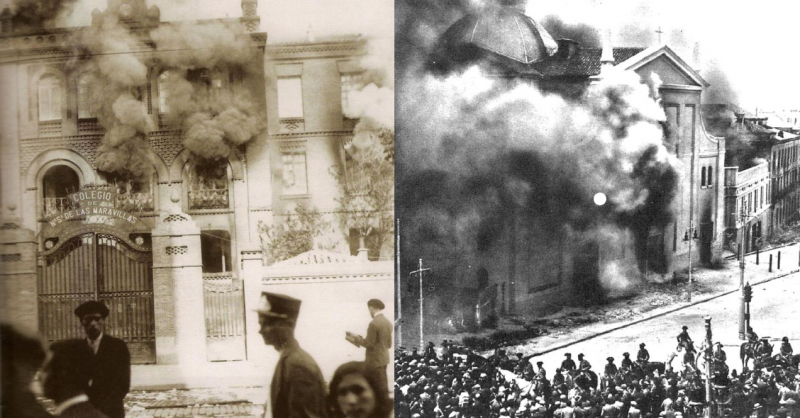
After the appointment of Jose Maria Gil-Robles, a representative of the right-wing party CEDA (Spanish Confederation of Independent Right), to the post of Minister of Defense, the General Staff was headed by Francisco Franco. This allowed Colonel Varela to receive the rank of brigadier general (he had been denied promotion several times before), but he did not receive any real position.
According to historian Hugh Thomas, Varela, whom the Carlist leaders met in Guadalajara prison, after his release traveled through the Pyrenean villages in the guise of a priest under the name "Uncle Pepe", being in fact a harbinger of war. When he was promoted to general, Varela's place was taken by Colonel Rada [8].
Being a traditionalist and seeking to restore the Catholic monarchy, Varela had great sympathy for the Carlists and maintained wide contacts with them, but nevertheless he himself was not a Carlist, if by this we mean that he was under the discipline of this organization [1]. He also maintained contacts with General Sanjurjo (who was exiled to Portugal). The general was waiting for the right moment to begin active actions against the republic.
General on the fronts of the civil war
After the February 1936 elections, which were won by the Popular Front coalition, Varela's conspiratorial activities intensified. In March, by order and on behalf of Sanjurjo, he convened several meetings in Madrid with the participation of Generals Francisco Franco, Emilio Mola, Valentin Galarza Morante, Luis Orgaz, Joaquin Fanjul, at which a plan was put forward to seize the Ministry of War with the help of General Angel Rodriguez del Barrio, appointed Head of the Main Military Inspectorate. Angel withdrew from the project at the last moment, and its implementation was postponed [2].
In organizing the military uprising that began on July 17–18, 1936, General Varela played a very important role and was present at the main preparatory meetings on behalf of General Sanjurjo, who was in exile in Portugal. The fact that all participants in the uprising saw Sanjurjo as the natural leader of the uprising provided General Varela with high authority.
On July 18, 1936, General Varela was forty-five years old, still a relatively young man with a promising future and at the same time experienced, having fought in the war in Africa and undergone military training abroad. The outbreak of the war should have allowed him to develop all his knowledge, which he did, proving himself to be a good strategist and an extraordinary tactician.
In addition, his rapport with General Franco allowed him to correctly interpret his orders, which is why he ended up on the main fronts. His greatest success was the capture of the Alcazar in Toledo. His photograph with General Franco and Colonel Moscardo among the ruins of the Alcazar was published in newspapers around the world [1].
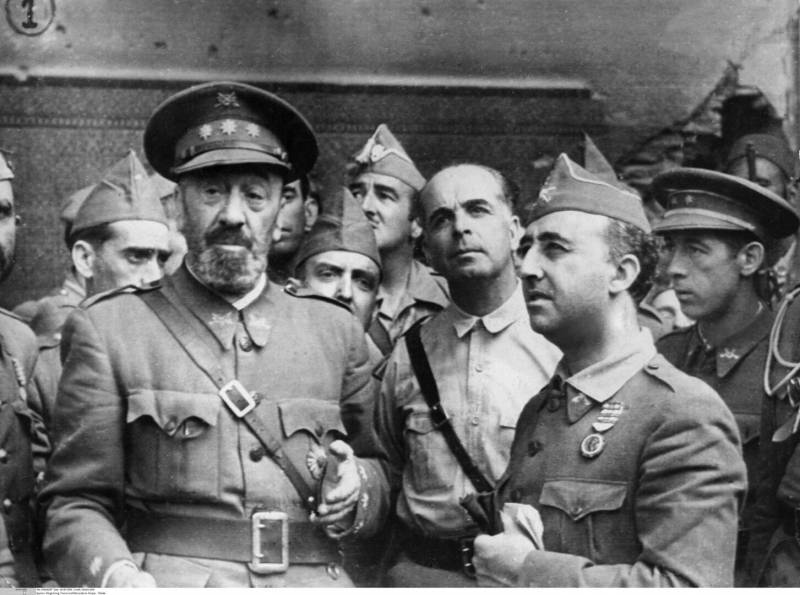
At the beginning of the Spanish Civil War, Varela saw action in and around Madrid, then in March 1937 he was appointed commander of the Avila Division. Later, Varela took part in numerous battles (the Battle of Jarama), as well as in the battles of Teruel, Aragon and Levante. In December 1937, in the Villanueva de la Cañada area, he was seriously wounded and was evacuated to the Sangre de Grignon hospital.
On May 12, 1938, Francisco Franco promoted José Enrique Varela to the rank of major general, and the following year he was appointed minister of defense in the first government of Francoist Spain.
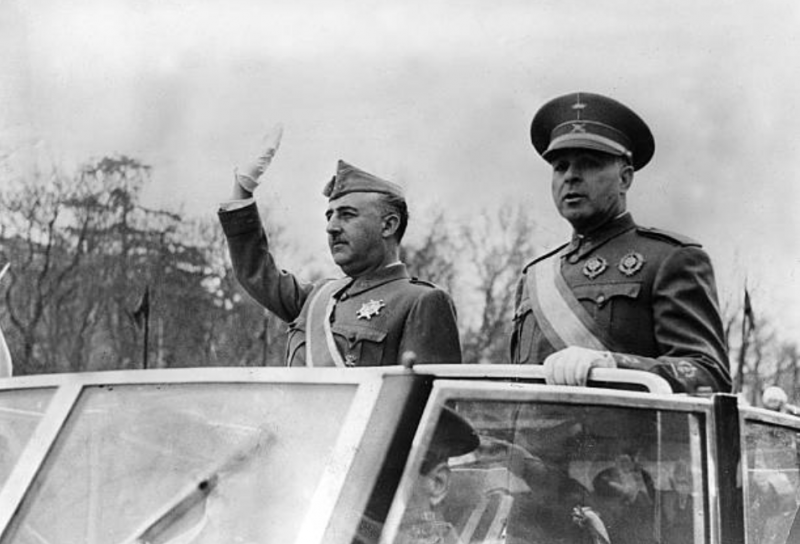
Generalissimo F. Franco (left) and Minister of War General José Varela greet the crowd in Madrid on the anniversary of the victory over Republican Spain.
It is worth noting here that H. E. Varela, throughout the period of the civil war, opposed harsh repression and adhered to a concept of justice associated with general principles of law. For this reason, he clashed with some generals, in particular with Gonzalo Queipo de Llano, who became famous for his harsh repression.

General Queipo de Llano. In 1930, he led the Republican Military Organization and collaborated with the Republican Revolutionary Committee, which led the anti-monarchist conspiracy. After the failure of the uprising against King Alfonso XIII, General Queipo de Llano emigrated to Portugal and returned to Spain after the overthrow of the monarchy in April 1931. He was considered a consistent supporter of the republic, and his participation in the conspiracy came as a surprise to many.
Being at one time a staunch republican, this anti-monarchist with sadistic inclinations overdid it with executions in the cities and villages of Andalusia and was pulled out of Seville, where F. Franco’s headquarters was located [7]. Nevertheless, Queipo de Llano had great services to the Francoists, because without him the uprising in Seville would not have been successful, and therefore he was untouchable.
However, Varela subsequently created active obstacles to his career advancement - when the decree on the re-establishment of military districts was published, General Queipo de Llano, who led the Southern Army, was not appointed head of the Second Military District, located in Seville.
And after the end of the civil war, on July 8, 1939, General Queipo de Llano was appointed captain general of the 2nd Military Region, but this was an honorary appointment, since twelve days later Generalissimo Franco sent him on a military mission of a diplomatic nature to Italy. A few days earlier, General Varela was appointed Minister of War [1].
General Queipo de Llano perceived this as repression. He said the following:
In addition, Queipo de Llano also believed, and in this case he was not mistaken, that the Grand Cross of the Order of Saint Ferdinand was not awarded to him because General Varela, Minister of the Army from August 1939 to September 1942, was against it. The general had to wait until 1943 to receive this award [1].
Finally, it should be noted that there was a direct connection between General Varela's concept of military justice and the work entrusted to him by the caudillo when he appointed him Minister of the Army and personally entrusted him with the preparation of the mandatory reports on commutations of death sentences, which were considered in the Council of Ministers.
Varela's career after the end of the civil war
After the outbreak of World War II, José Enrique Varela was an opponent of Spain entering the war on the side of the Axis powers and a supporter of neutrality, justifying his position, among other things, with reports on the state of affairs in the army. This became the reason for his constant friction and clashes with the Minister of the Interior Ramon Serrano Suñer, who took a different position, and many Falangists [2].
Varela made every effort to keep Spain out of the fighting, his religious and moral principles, as well as a broader geopolitical outlook than many others, forced him to distance himself from Nazi Germany, and therefore he did everything possible to prevent rapprochement with Germany and Italy.
On October 31, 1941, three months after being promoted to lieutenant general, J. E. Varela married Casilda Ampuero, who belonged to a Carlist family and was herself a Carlist. As mentioned above, Varela had sympathies for this movement and had wide connections with it; his political ideas can be called close to traditionalism, but Francisco Franco never considered that he was taking a “Carlist position” in his government. He knew him too well and for too long to attribute to him Carlist views, as, for example, to Esteban Bilbao, the Minister of Justice [1].
Nevertheless, the Falangists, who were increasingly hostile to Varela and the Carlists in general, considered him a Carlist. Many Falangists believed that Germany would win the war, and therefore Spain, in order not to be left out, should enter it on the side of the Axis.
Tensions grew, and soon a tragic event occurred that had a serious impact on the general.
In August 1942, in Bilbao, in the Basilica of Our Lady of Begona, a mass was held in memory of the Recete soldiers who died at the front during the civil war. It was attended by the Minister of War Varela and his wife, as well as a number of Carlists - the Minister of the Interior Antonio Iturmendi, Jose Maria Arauz de Robles, as well as the mayor of Bilbao.
After the mass, General Loriga invited Casilda Ampuero to leave the church, since Minister Varela was surrounded by people who wanted to say something to him or just shake hands. After some time, Varela came out alone, and as soon as he did, there was an explosion.
As a result of the explosion, 72 people were injured and taken to hospitals in Bilbao. The terrorist attack was carried out by one of the Phalangists, who threw a grenade into the crowd. He was immediately arrested by the police.
From documents in the archives of General Varela, it is known that he considered the leaders of the Phalanx to be the masterminds of the attack and asked the head of state to take action against them. Already on August 24, 1942, he had a telephone conversation with Franco, accompanied by mutual reproaches, and a few days after the attack, General Varela went to El Pardo for a long conversation with the Generalissimo [1]. After this, Varela resigned as minister, which was accepted.
The perpetrators of the terrorist attack, Hernando Calleja and Juan José Domínguez Muñoz, were sentenced to death, but the former’s sentence was commuted because he was a war veteran. The second one was shot. Serrano Suñer, Franco's brother-in-law, asked for Juan José Domínguez's death sentence to be commuted, but Francisco Franco ignored his request. Subsequently, Serrano Suñer himself was removed from the government - after this incident, Franco removed many Falangists from power.
Despite the fact that Varela did not hold any positions for some time, he did not lose the confidence of the caudillo, who in 1945 appointed him high commissioner of the Moroccan protectorate.
On April 13, 1950, with the rank of Lieutenant General, José Enrique Varela was appointed member of the Council of Regency and the Council of the Realm. A year later he died of leukemia while on holiday in Tangier during Holy Week 1951. Having received the rank of captain general and the title of Marquis of Varela de San Fernando, he was buried in his hometown [2].
Использованная литература:
[1]. Federico Martinez Roda. Varela: el general antifascista de Franco / prólogo, Stanley G. Payne. Madrid: Esfera de los Libros, 2012.
[2]. Fernando Puell de la Villa. José Enrique Varela Iglesias, in Diccionario Biográfico Español, Madrid, Real Academia de la Historia, 2018.
[3]. Volkov M. S. The ruling elite of Spain in the second half of the XX century. - M. Russian Foundation for the Promotion of Education and Science, 2019.
[4]. Alejandro de Quesada. The Spanish Civil War 1936–39 (1): Nationalist Forces. Osprey Publishing (Men-at-Arms), 2014.
[5]. Krichinsky. P.V. Armed forces in the socio-political life of Spain, 1918–1936: Dis. ...cand. ist. Sciences: 07.00.03 M., 1999.
[6]. Quote from: Archivo Municipal de Cádiz. Fondo del General José Enrique Varela Iglesias. Documento 59–69, visor 33. En adelante ACGJEVI 59–69 visor 33.
[7]. Krelenko D. M. Francisco Franco: the path to power. - Saratov: Sarat Publishing House. un-ta, 2002.
[8]. Thomas, H. The Spanish Civil War. 1931–1939 – M.: Tsentrpoligraf, 2003.
[9]. J. Fernández-Coppel, Queipo de Llano. Memorias de la Guerra Civil, op. cit., p. 207.
Information